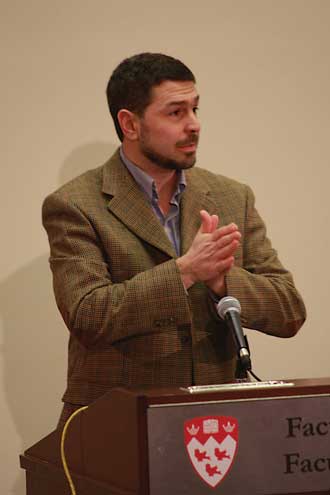Maher Arar addresses state of civil liberties in a post-9/11 world
 A former CIA counter-terrorism chief, Maher Arar said, was once quoted as saying the U.S. response to 9/11 could be summed up thusly: the gloves came off.
A former CIA counter-terrorism chief, Maher Arar said, was once quoted as saying the U.S. response to 9/11 could be summed up thusly: the gloves came off.
“In taking off the gloves,” Arar continued, as he addressed an audience at McGill’s Faculty of Law, “the U.S. and its closest allies also abandoned many of their democratic values. The U.S. government, once better known for fighting to spread democracy through the world, soon found new allies in some of the most brutal Middle Eastern dictatorships. Allies of the U.S., including Canada unfortunately, followed soon after.”
Arar, a Canadian citizen, came to public attention after he was seized by American authorities while transiting through New York on a business trip. He was subjected to the U.S.’s extraordinary rendition program and sent to Syria, where he was held for approximately a year, tortured and kept in inhumane conditions. Once he finally returned to Canada, a public inquiry found there was no evidence linking Arar to terrorist activity, and that Canadian officials had been complicit in his torture.
Arar was well-placed to address the McGill Symposium on Counterterrorism and Civil Liberties, at the Law faculty on March 4 and 5. The event was an opportunity for lawyers, academics and advocates to weigh in on the debate over Western responses to terrorism threats, their effectiveness, and their compliance with human-rights standards. The event drew such high-profile speakers as documentary filmmaker Alexandre Trudeau, former general counsel to the Canadian Security and Intelligence Service and former RCMP complaints commissioner Paul Kennedy, as well as Paul Champ and Simon Potter, two of Canada’s most renowned human-rights lawyers.
Participants took a critical look at how this country and others have fared in balancing antiterrorism initiatives with respect for civil liberties.
“Since the events of 9/11, we have unfortunately witnessed the wholesale campaign against our values of justice and promotion of peace, all in the name of the very elusive goal of security,” Arar said. “This campaign has been led by the government of the United States, a country has abandoned its commitments to civil rights for the sake of a sense of security that nearly 10 years later, is still a distant goal.” Arar invoked the hundreds of thousands of civilian lives lost since the U.S. invasion of Iraq. “What was the damage done to the cause of terrorism? Absolutely zero. In fact, to the contrary, terrorism has instead increased since then.”
As for Canada, he said, “there is no doubt that our laws and practices been modified to please our neighbour to the south.”
For example, Canada’s Anti-terrorism Act, our answer to the U.S. Patriot Act, was enacted only three months after 9/11 and “was introduced with next to no consideration for whether it was in fact good legislation, or even necessary.” Criminal law had always been sufficient to prosecute terrorist acts, Arar said, and this new law, along with a marked increase in the use of security certificates which allow detention without charge, has led to abuse of civil liberties. “Terrorism did not start with 9/11,” said Arar. “As taxpayers, would we have had a better return on investment if our security agencies used standard existing policing techniques along with our solid legal system? Maybe it is time to revise our counter-terrorism strategy in light of what we have learned.”
Despite all he has endured, Arar did have some words of praise for the Canadian government, congratulating it for launching two important official inquiries to address these problems (the Iacobucci inquiry on the detention of three men, and the O’Connor inquiry on the treatment of Arar himself), something no other Western government has done.
―Pascal Zamprelli, BCL/LLB’05
